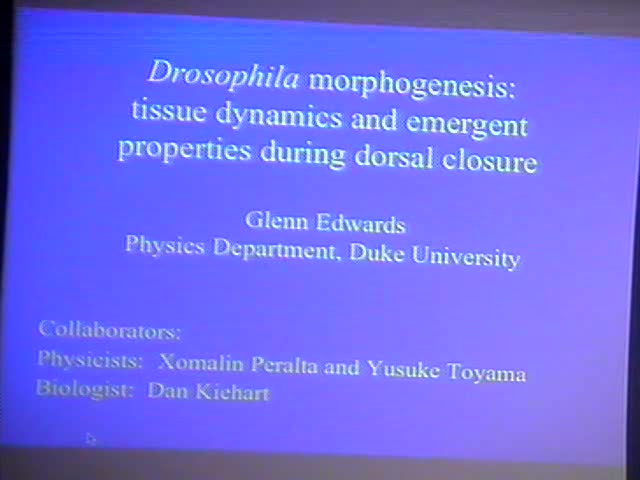Drosophila Morphogenesis: Tissue Dynamics and Emergent Properties During Dorsal Closure
Presenter
March 6, 2008
Keywords:
- Image processing
MSC:
- 68U10
Abstract
Dorsal closure, an essential stage of Drosophila morphogenesis, provides a
model system for tissue dynamics. Our research approach is based on modern
genetics, in vivo imaging, laser microsurgery, digital image processing,
and quantitative modeling to identify the mechanical forces that connect
the genetic program of development to morphogenesis. Key to the dynamics
of dorsal closure are four biological processes, involving three tissues,
that are coordinated in space, synchronized in time, and remarkably
resilient both to genetic perturbations and to laser perturbations. These
processes can upregulate in response to laser perturbation, where there are
spatial, kinematic, and dynamic asymmetries associated with upregulation.
There also are asymmetries observed during non-perturbed, wild type
closure, which are associated with the failure of dorsal closure in several
mutant embryos. We are quantitatively characterizing emergent properties
during dorsal closure, i.e., a velocity governor and the apparent
coordination and synchronization of cell activities for these tissues.
Peralta et al. Upregulation of forces and morphogenic asymmetries in dorsal
closure during Drosophila development. Biophysical Journal 92: 2583-2596
(2007).
Kiehart et al. 2005. Ultraviolet Laser Microbeam for Dissection of
Drosophila Embryos. In Cell Biology: A Laboratory Handbook, Third Edition.
J. E. Celis, editor. Elsevier, San Diego. 87-103 (2005).
Franke et al. Nonmuscle myosin II generates forces that transmit tension
and drive contraction in multiple tissues during dorsal closure. Curr Biol.
15: 2208-2221 (2005).
Hutson et al. Forces for morphogenesis investigated with laser microsurgery
and quantitative modeling. Science 300: 145-149 (2003).
Kiehart et al. Multiple forces contribute to cell sheet morphogenesis for
dorsal closure in Drosophila. J. Cell Biol. 149: 471-490 (2000).
